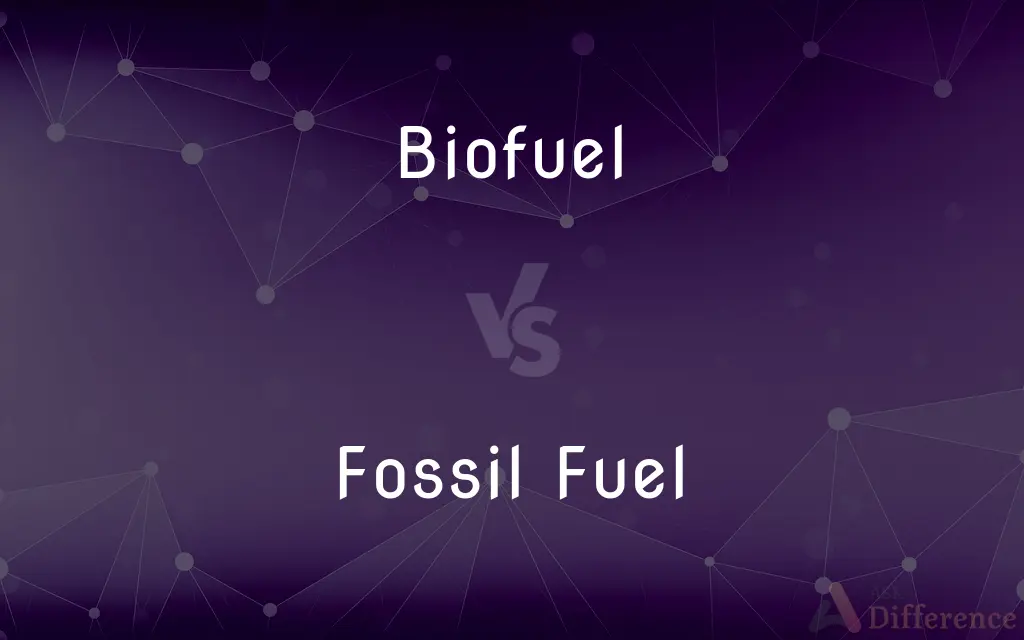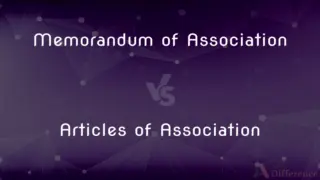Biofuel vs. Fossil Fuel — What's the Difference?
By Tayyaba Rehman — Published on December 17, 2023
Biofuel is derived from organic materials, while fossil fuel originates from ancient organic matter under earth's crust over millennia.

Difference Between Biofuel and Fossil Fuel
Table of Contents
ADVERTISEMENT
Key Differences
Biofuel, derived from living organisms or organic matter, presents a renewable energy source, while Fossil Fuel, sourced from ancient, decayed plants and animals, is non-renewable. Both serve as energy sources, but they differ significantly in their origin, environmental impact, and sustainability.
Biofuels, like ethanol or biodiesel, are products of recent biological processes such as plant fermentation. On the contrary, Fossil Fuels, including coal, oil, and natural gas, originate from processes that took millions of years, capturing the Earth's ancient organic material. The renewability of Biofuels offers a distinct advantage over the finite nature of Fossil Fuels.
Biofuels, when burned, release carbon dioxide previously absorbed by the plants from which they were derived, effectively making them carbon-neutral. Fossil Fuels, however, introduce 'new' carbon into the atmosphere, a remnant from ancient life, leading to increased greenhouse gas emissions and global warming. This fundamental difference highlights Biofuel's potential role in combating climate change compared to the environmental challenges posed by Fossil Fuels.
In terms of economic implications, Biofuel production can support agricultural sectors, creating jobs, and potentially stabilizing commodity prices. Fossil Fuels, though historically crucial for industrialization and economic growth, now face challenges like price volatility due to geopolitical tensions and extraction costs. As energy demands grow, the economic dynamics of Biofuels and Fossil Fuels will be pivotal in shaping global energy policies.
While Biofuels can be produced locally, reducing dependence on foreign energy and potentially bolstering energy security, Fossil Fuels often necessitate complex global supply chains. This difference impacts not just energy prices but also geopolitical relationships and strategies. As nations explore energy diversification, the balance between Biofuel usage and Fossil Fuel dependence remains a key strategic consideration.
ADVERTISEMENT
Compare with Definitions
Biofuel
Renewable energy sourced from organic matter.
Algae is a promising source for biofuel production.
Fossil Fuel
Extracted from below the earth's surface.
Natural gas, a fossil fuel, is used for cooking and heating.
Biofuel
A fuel derived from living organisms.
Corn can be converted into biofuel for vehicles.
Fossil Fuel
Associated with high greenhouse gas emissions.
Burning fossil fuel in cars contributes to global warming.
Biofuel
Energy derived from recently living materials.
Ethanol, a biofuel, is commonly mixed with gasoline.
Fossil Fuel
Fuels formed over millions of years.
Petroleum is a fossil fuel derived from ancient marine organisms.
Biofuel
A green alternative to traditional fuels.
Biodiesel, a type of biofuel, reduces emissions compared to regular diesel.
Fossil Fuel
Energy sourced from ancient organic remains.
Coal, a type of fossil fuel, has been used for centuries.
Biofuel
A sustainable choice for fuel needs.
With proper cultivation, biofuel crops can be replanted annually.
Fossil Fuel
A dominant but non-renewable energy source.
The world's economy heavily relies on fossil fuel like oil.
Biofuel
A fuel, such as biogas or biodiesel, that is produced from renewable resources, especially plant biomass, vegetable oils, or treated municipal and industrial wastes.
Biofuel
Any fuel that is obtained from a renewable biological resource, especially from biomass.
Common Curiosities
What defines a fossil fuel?
Fossil fuel is an energy source derived from ancient organic matter buried for millions of years.
Are biofuels carbon-neutral?
While biofuels release CO2 when burned, the plants used to produce them absorb CO2, making them closer to carbon-neutral than fossil fuels.
Why is biofuel considered renewable?
Biofuel is renewable because its sources, like crops, can be regrown and harvested repeatedly.
How does burning fossil fuel impact the environment?
Burning fossil fuel releases high levels of CO2, contributing to global warming and environmental degradation.
How are fossil fuels extracted?
Fossil fuels are extracted through mining or drilling processes, depending on the type of fuel.
Are there environmental concerns with biofuels?
Yes, concerns include deforestation, water use, and impact on food crops when producing biofuels.
What is biofuel?
Biofuel is a type of fuel derived from organic materials like plants or animal waste.
How can biofuel production impact food supply?
If agricultural land prioritizes biofuel crops over food crops, it can impact food supply and prices.
What are the primary forms of fossil fuels?
The primary fossil fuels are coal, oil, and natural gas.
Do all countries have equal access to fossil fuel?
No, fossil fuel reserves are unevenly distributed, leading to economic and geopolitical implications.
What are common types of biofuels?
Common biofuels include ethanol, biodiesel, and biogas.
Why are biofuels touted as a sustainable option?
Biofuels are considered sustainable due to their renewability and potential for reduced emissions.
Can biofuel completely replace fossil fuel in the future?
While biofuel offers a promising alternative, a complete replacement would require technological advancements and global cooperation.
Why can't we switch immediately from fossil fuel to biofuel?
Challenges include production scalability, infrastructure adaptation, and economic factors.
What's the economic status of fossil fuel?
Fossil fuel remains dominant globally, but it's facing challenges from renewables and environmental concerns.
Share Your Discovery

Previous Comparison
Memorandum of Association vs. Articles of Association
Next Comparison
First Language Acquisition vs. Second Language AcquisitionAuthor Spotlight
Written by
Tayyaba RehmanTayyaba Rehman is a distinguished writer, currently serving as a primary contributor to askdifference.com. As a researcher in semantics and etymology, Tayyaba's passion for the complexity of languages and their distinctions has found a perfect home on the platform. Tayyaba delves into the intricacies of language, distinguishing between commonly confused words and phrases, thereby providing clarity for readers worldwide.












































